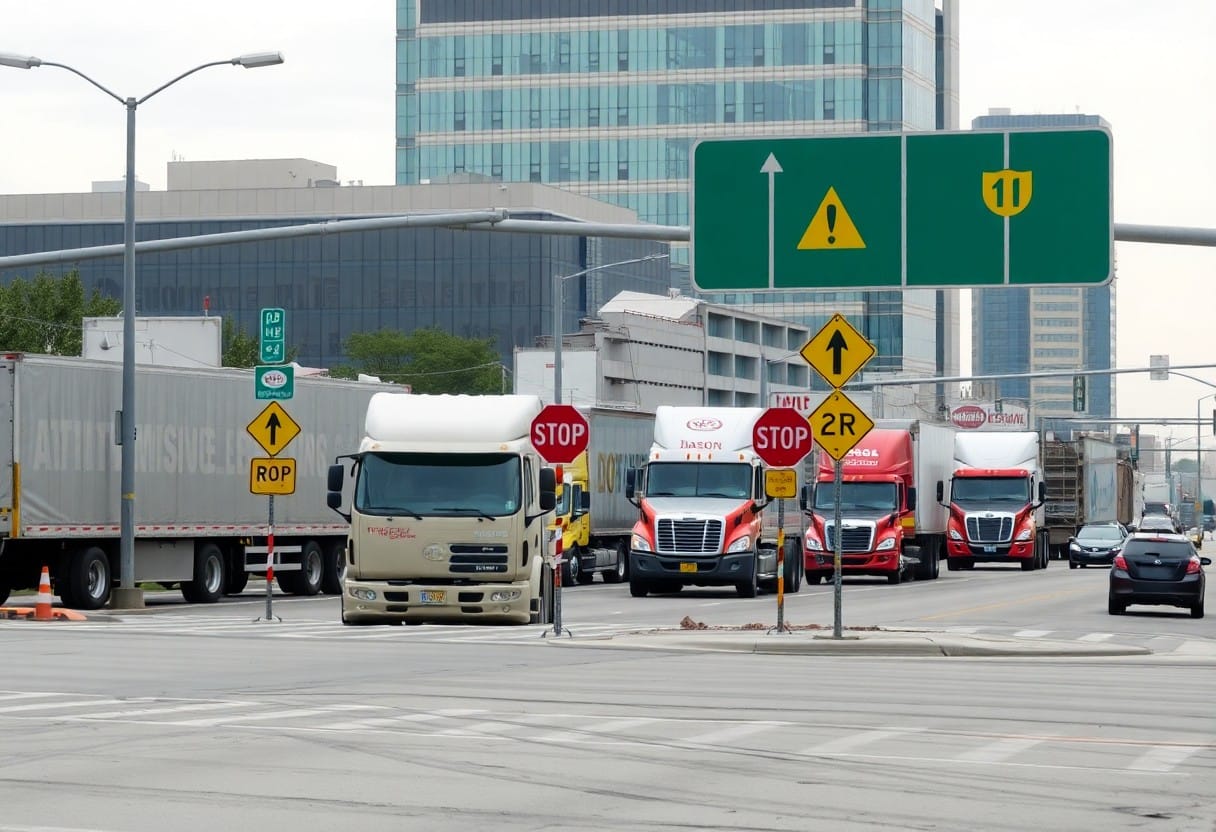It’s important to understand the long-term consequences of a truck accident injury in Birmingham, as these can significantly affect your life and well-being. Your physical health may face challenges that require ongoing medical treatment and rehabilitation, and you might also deal with emotional and psychological effects like PTSD or anxiety. Financial burdens can accumulate due to medical expenses and lost wages, impacting your family’s stability. By being informed, you can take necessary steps to manage the repercussions and advocate for your rights.
Understanding Truck Accident Injuries
While truck accidents can lead to a variety of injuries, understanding these injuries is fundamental for effective recovery and compensation. The force involved in a truck accident is substantial due to the vehicle’s size and weight, which can result in serious harm not just to drivers but also to passengers and pedestrians. You should be aware of the types of injuries that can arise and how they may affect your life long-term.
Common Types of Injuries
Above, you will find common injuries associated with truck accidents:
| Injury Type | Description |
| Whiplash | Neck injury caused by sudden movement. |
| Fractures | Broken bones due to impact forces. |
| Spinal Cord Injuries | Permanently affects mobility and sensation. |
| Traumatic Brain Injuries (TBI) | Can lead to cognitive and physical impairments. |
| Lacerations | Deep cuts affecting skin and tissue. |
Knowing the common types of injuries can help you seek appropriate treatment and understand your potential challenges.
Immediate and Long-Term Effects
An accident can inflict both immediate and long-term consequences on your health. The physical injuries may take time to heal, but emotional and psychological impacts often linger much longer, affecting various aspects of your daily life, including your work and relationships.
With truck accident injuries, you may face not only acute symptoms but also chronic conditions that can disrupt your lifestyle. For example, an injury such as a spinal cord injury can result in permanent mobility issues, while a traumatic brain injury could affect your cognition and emotional well-being. The long-term treatment costs can be significant, and the implications on your mental health can prolong your recovery process. It’s crucial to recognize these potential effects so you can take proactive steps toward managing your health post-accident.

Psychological Impact of Truck Accidents
One of the most often overlooked effects of truck accidents is the psychological trauma that can arise from such a traumatic experience. Victims may find themselves grappling with feelings of anxiety, fear, or depression that can affect daily life, relationships, and overall mental well-being. Recognizing these symptoms and seeking help is crucial for your long-term recovery.
Emotional Trauma
Trauma from a truck accident can manifest in various ways, including intrusive thoughts, flashbacks, and emotional numbness. You may find yourself avoiding certain situations or places that remind you of the incident, making it difficult to resume your normal activities. Acknowledging these feelings is an important first step toward healing.
Coping Mechanisms and Treatment
Across the spectrum of recovery, employing effective coping mechanisms and seeking professional treatment can make a significant difference in your healing journey. You might consider therapy options such as cognitive-behavioral therapy (CBT) to address negative thought patterns or engage in group therapy to connect with others who understand your experiences.
Plus, incorporating self-care practices like mindfulness, meditation, and physical exercise can help alleviate symptoms of anxiety and depression. Engaging with a therapist can further guide you through your emotional turmoil, providing crucial tools to cope with distressing thoughts. Additionally, leaning on your support network—friends, family, or counselors—can create a safe environment for you to process your feelings. With appropriate strategies, you can work towards reclaiming your emotional well-being and building a fulfilling life post-accident.
Financial Burden of Long-Term Injuries
Assuming you suffer a long-term injury from a truck accident, the financial burden can be overwhelming. The costs associated with ongoing medical care, rehabilitation, and adjustments to daily living can quickly accumulate. This burden not only impacts your finances but can also add immense stress to your recovery process, forcing you to consider the future of your personal and family life.
Medical Expenses
After a truck accident, your medical expenses may become a substantial part of your financial worries. Ongoing treatments, medications, and therapy can lead to overwhelming costs that extend far beyond initial hospital bills, creating a significant long-term financial impact.
Loss of Income
Medical expenses aside, your loss of income due to a truck accident can further exacerbate your financial situation. When injuries prevent you from working, the implications can be dire, affecting not just you but also your family’s financial stability.
For instance, if your injury prevents you from returning to work for an extended period, you might face serious financial hardship. Your inability to earn a salary can limit your capacity to pay for vital bills, leading to increased debt and potential loss of assets. This loss, combined with ongoing medical costs, highlights the need for proper insurance and financial planning to safeguard your future.
Legal Implications and Responsibilities
Many people underestimate the legal repercussions that arise from a truck accident. In Birmingham, navigating the aftermath involves understanding your rights and responsibilities. You may face complex interactions with insurance companies, law enforcement, and legal entities. It’s important to seek legal counsel to ensure you are fully informed about your obligations and how to protect your interests.
Liability in Truck Accidents
Before entering into liability considerations, it’s imperative to know that determining fault in truck accidents can be complicated. You might need to assess multiple parties involved, including the truck driver, the trucking company, and potentially even manufacturers. Each case is unique, so understanding the specifics of your accident is vital for establishing liability.
Seeking Compensation
Responsibilities in the aftermath of the accident extend beyond legal obligations; you also have the potential to claim compensation for your injuries. This process can be intricate, requiring evidence and documentation to support your claim.
For instance, gathering medical records, accident reports, and witness statements can significantly bolster your case. Working with a dedicated attorney can help you navigate the complexities of filing a claim and increase your chances of receiving fair compensation for your medical bills, lost wages, and other related expenses. Make sure to document all relevant information and explore your options thoroughly to maximize your recovery.
Rehabilitation and Recovery Options
All truck accident injuries require a well-structured rehabilitation plan to ensure a smooth recovery. This plan often includes various therapies aimed at restoring your physical capabilities and emotional well-being. The duration and intensity of rehabilitation depend on the severity of your injuries, but exploring all available options is necessary for a successful recovery.
Physical Therapy
Against the backdrop of your injury, physical therapy serves as a fundamental aspect of your recovery. A qualified therapist will design a custom program to improve your strength, mobility, and overall function, helping you regain your independence.
Support Groups
Support groups can provide a vital connection to others who share similar experiences and challenges.
Due to the emotional and physical toll of recovering from truck accident injuries, support groups can be beneficial for you. These groups offer a platform for sharing your story, addressing emotional struggles, and gaining practical advice from peers who understand your situation. Engaging with others can significantly improve your mood and motivate you to pursue your rehabilitation goals, ultimately helping you in the long journey of recovery.
Preventative Measures for Future Accidents
Once again, it’s necessary to emphasize the importance of taking preventative measures to reduce the risk of truck accidents. By implementing safety protocols and being proactive, you can help ensure not only your safety, but also the safety of others on the road. Making a conscious effort to adhere to regulations and best practices can significantly decrease the likelihood of an accident.
Safe Driving Practices
Any responsible truck driver understands the need for safe driving practices. This includes obeying speed limits, maintaining a safe distance from other vehicles, and avoiding distractions while driving. Consistently prioritizing these habits will greatly enhance your safety and that of others on the road.
Importance of Vehicle Maintenance
Around the clock vehicle maintenance is necessary for ensuring your truck operates safely and efficiently. Regular inspections and servicing can identify potential problems before they lead to accidents, ensuring that your vehicle remains in optimal condition.
Consequently, committing to regular vehicle maintenance plays a significant role in accident prevention. Ignoring small issues can lead to serious mechanical failures that may compromise your ability to control the vehicle. Ensure that your brakes, tires, and lights are routinely checked and maintained to avoid breakdowns and enhance your safety on the road. Furthermore, keeping up with regular oil changes and replacing worn-out parts can not only prolong the lifespan of your vehicle but also provide you with peace of mind while driving.
Conclusion
On the whole, understanding the long-term consequences of a truck accident injury in Birmingham is vital for you to navigate the complexities of recovery and compensation. Your physical, emotional, and financial well-being may be significantly impacted, requiring ongoing medical care and lifestyle adjustments. Being informed about your rights and the potential challenges ahead allows you to make proactive decisions for your future. As you assess your situation, seeking professional guidance can further empower you to ensure that your needs are met and your recovery journey is as smooth as possible.



















